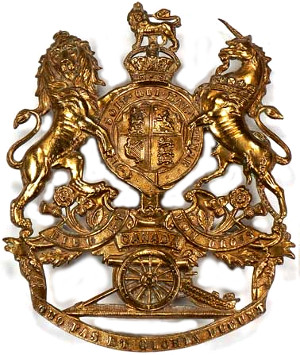Topic: Canadian Militia

Military Matters
The Work and Pay in "A" and "B" Batteries
Some Very Mistaken Notions Answered
The Toronto Daily Mail, 11 March 1882
To the Military Editor of The Mail.
 Sir.—I read with much interest a letter signed "Ex-Cadet" in The Mail a couple of weeks since. The writer complained of the high-handed way in which military matters had been conducted at the Royal Military College, Kingston, resulting in the removal of Major Ridout and the wigging of other officers. I admire the frank and honest outspoken words "Ex-Cadet," and as a Canadian fully concur in his remarks. I believe an investigation into these matters will likely take place in the House at Ottawa, when we will get more definite information respecting the occurrences alleged to have taken place. Till then I would wait before offering any more remarks on the subject.
Sir.—I read with much interest a letter signed "Ex-Cadet" in The Mail a couple of weeks since. The writer complained of the high-handed way in which military matters had been conducted at the Royal Military College, Kingston, resulting in the removal of Major Ridout and the wigging of other officers. I admire the frank and honest outspoken words "Ex-Cadet," and as a Canadian fully concur in his remarks. I believe an investigation into these matters will likely take place in the House at Ottawa, when we will get more definite information respecting the occurrences alleged to have taken place. Till then I would wait before offering any more remarks on the subject.
There is a question, however, which I would ask. Could you or any of your readers explain what it is causes so many desertions from A and B Batteries at Quebec and Kingston? Are the men properly treated in respect of food, clothing, lodging, and medical treatment, and are they not overworked in respect to drill and fatigues" I think from what I have personally seen that they are both poorly clad and overworked, whilst the pay is not sufficient in this country of good wages and plentiful work to induce respectable young men to join and remain in these batteries. I have seen then drilled and marched out in heavy rains. They seem to grow dissatisfied, and so desert in far too many instances, and so old men, some grey-headed ones, and army life pensioners are brought in, who would be unable to undergo the hard work of active service if called upon tomorrow. I remember a soldier of one of these batteries in conversation with a friend and myself some time ago complaining of the incessant fatigue he had, in particular of cutting so much wood for staff-sergeants. Does the government pay these staff-sergeants or not sufficiently to enable them to pay for their own wood being cut, and thus to enable soldiers to learn their drill instead of cutting wood? The uniform this soldiers was wearing was not of good quality, and he had often to pay for extras from his small pay—this is another complaint that should be seen to at once by someone. Treat men as men, and not as schoolboys, and desertion would stop at once, and in a short time we would have a force upon which we could rely, and so be independent of deserters from the British and American services. Such men are never to be depended upon in seasons of real peril and danger. Make the service worth and steady respectable young man joining, and then we can dispense with the riff-raff we are often obligated to take in the ranks of our two schools of gunnery, I speak from personal observation, and as I am a taxpayer, I have a personal interest in the matter; we pay for an article, and we naturally expect our money's worth in that article. There has been far too much desertion already, and it is high time it was stopped.
Yours, &c.
A Canadian
March 7, 1882

From the Editor, Military Column,
If our correspondent knew more about the management of "A" and "B" Batteries he would not be make assertions like those contained in his letter. Both batteries are well conducted and governed, and if a man occasionally deserts it is not the fault of the management. A good soldier has nothing to complain of; it is only the shiftless fellows who expect that a couple hours' drill each day embraces every duty of a soldier. They entirely overlook the fact that wood has to be cut for cooking and heating purposes, the barracks cleaned, the platforms in Fort Henry and the different towers traversed and cleaned occasionally, together with guard duty and a score of other things. In reference to cutting wood for the staff-sergeants, it is only defaulters who have this task to perform. The clothing is the same as that issued to the artillery in England, and every man on joining gets a full kit. (For particulars see para. 817, R. and O., 1879.) Marching men out in wet, sloppy weather is a very rare occurrence in either battery, and does them no harm, as they are generally allowed a half-holiday afterwards to give their kits a thorough overhauling. What is required, however, is better pay, which, of course, would induce a better class of men to present themselves and give the commanding officer a chance to secure good men, The plan adopted in the United States army of increasing the pay in each rank according to length of service is a good one, and might be adopted with advantage in these corps.

